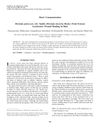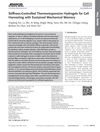 April 2018 in “The journal of investigative dermatology/Journal of investigative dermatology”
April 2018 in “The journal of investigative dermatology/Journal of investigative dermatology” Mitochondrial dysfunction may contribute to chronic inflammation and immune system issues in Lichen planopilaris.
 23 citations,
February 2015 in “International Journal of Molecular Sciences”
23 citations,
February 2015 in “International Journal of Molecular Sciences” Colchicine can inhibit hair growth by affecting cell activity and protein expression in hair follicles.
 64 citations,
March 2005 in “Journal of Investigative Dermatology”
64 citations,
March 2005 in “Journal of Investigative Dermatology” Brain-Derived Neurotrophic Factor (BDNF) slows down hair growth and promotes hair follicle regression.
 121 citations,
May 2009 in “Journal of Ethnopharmacology”
121 citations,
May 2009 in “Journal of Ethnopharmacology” Eclipta alba extract may help hair grow similarly to Minoxidil.
 10 citations,
February 2007 in “Clinical techniques in small animal practice”
10 citations,
February 2007 in “Clinical techniques in small animal practice” Dogs with sex hormone imbalances may not drink or pee a lot but often lose hair on their body and can have reproductive system issues.
 35 citations,
December 2006 in “Journal of medicinal food”
35 citations,
December 2006 in “Journal of medicinal food” Morinda pubescens fruit extract helps wounds heal faster in rats.
 27 citations,
September 1999 in “Journal of Investigative Dermatology”
27 citations,
September 1999 in “Journal of Investigative Dermatology” Human skin cells contain Protease Nexin-1, and male hormones can decrease its levels, potentially affecting hair growth.
5 citations,
February 2021 in “Gels” HYDRO DELUXE BIO hyaluronic acid hydrogel is compatible with skin cells, may reduce inflammation, promote blood vessel growth, and protect against oxidative stress, suggesting it could help revitalize hair follicles.
 29 citations,
September 2012 in “Dermatologic Clinics”
29 citations,
September 2012 in “Dermatologic Clinics” Hair disorders are caused by a complex mix of biology, genetics, hormones, and environmental factors, affecting hair growth and leading to conditions like alopecia.

N793 may improve hair density in people with mild hair thinning.
 21 citations,
November 2010 in “Journal of molecular medicine”
21 citations,
November 2010 in “Journal of molecular medicine” FoxN1 gene is essential for proper thymus structure and preventing hair loss.
 December 2022 in “Scientific Reports”
December 2022 in “Scientific Reports” Stem cells from whiskers can be transplanted to stimulate hair growth.
 April 2024 in “International journal of clinical trials”
April 2024 in “International journal of clinical trials” SesZen-Bio™ improves hair density, thickness, and overall hair health.
96 citations,
December 2018 in “Immunity” Targeting TGFβ can improve skin immunity in older people.
 January 2017 in “Journal of Dermatology and Venereology”
January 2017 in “Journal of Dermatology and Venereology” Naringenin and Hesperetin may help hair grow and protect hair cells from damage.
 13 citations,
March 2021 in “British Journal of Pharmacology”
13 citations,
March 2021 in “British Journal of Pharmacology” KY19382 helps regrow hair and create new hair follicles.
 1 citations,
January 2001 in “Cosmetics and toiletries”
1 citations,
January 2001 in “Cosmetics and toiletries” Procyanidin B-2 from apple juice significantly increases hair growth and may be more effective than minoxidil without side effects.
 19 citations,
November 2018 in “Experimental Dermatology”
19 citations,
November 2018 in “Experimental Dermatology” The spiny mouse can regenerate its skin without scarring, which could help us learn how to heal human skin better.

A 9-year-old girl developed type 1 diabetes and alopecia after being treated for a rare kidney disease.
24 citations,
March 2016 in “Journal of Investigative Dermatology” TIP39 and PTH2R help control calcium levels and skin cell development.
 April 2019 in “The journal of investigative dermatology/Journal of investigative dermatology”
April 2019 in “The journal of investigative dermatology/Journal of investigative dermatology” DHT may reduce inflammation caused by certain bacteria in skin cells.
 22 citations,
January 2017 in “Advanced Healthcare Materials”
22 citations,
January 2017 in “Advanced Healthcare Materials” The hydrogels help harvest cells while preserving their mechanical memory, which could improve wound healing.
 12 citations,
August 2022 in “Stem cell reviews and reports”
12 citations,
August 2022 in “Stem cell reviews and reports” Increasing PBX1 reduces aging and cell death in hair follicle stem cells by boosting SIRT1 and lowering PARP1 activity.
10 citations,
June 2016 in “Cell Transplantation” Sebaceous glands can help harvest hair follicle stem cells to regenerate skin and hair.
 1 citations,
December 2023 in “Scientific reports”
1 citations,
December 2023 in “Scientific reports” 3D microenvironments in microwells improve hair follicle stem cell behavior and hair regeneration.
 62 citations,
January 2000 in “Developmental dynamics”
62 citations,
January 2000 in “Developmental dynamics” Notch-related genes play a key role in the development and cycling of hair follicles.

The document concludes that the development of certain tumors is influenced by genetic background and that a specific gene modification can lead to tumor regression and reduced growth.
 3 citations,
January 2012 in “Elsevier eBooks”
3 citations,
January 2012 in “Elsevier eBooks” Burn scars form abnormally due to changes in wound healing, and more research is needed to improve treatments.
 33 citations,
August 2013 in “Journal of Investigative Dermatology”
33 citations,
August 2013 in “Journal of Investigative Dermatology” Human hair follicle stem cells show signs of low oxygen levels, which may be important for hair growth and preventing baldness.
 6 citations,
March 2019 in “International Journal of Molecular Medicine”
6 citations,
March 2019 in “International Journal of Molecular Medicine” Finasteride microspheres help reduce hair loss for up to eight weeks with fewer side effects.


























